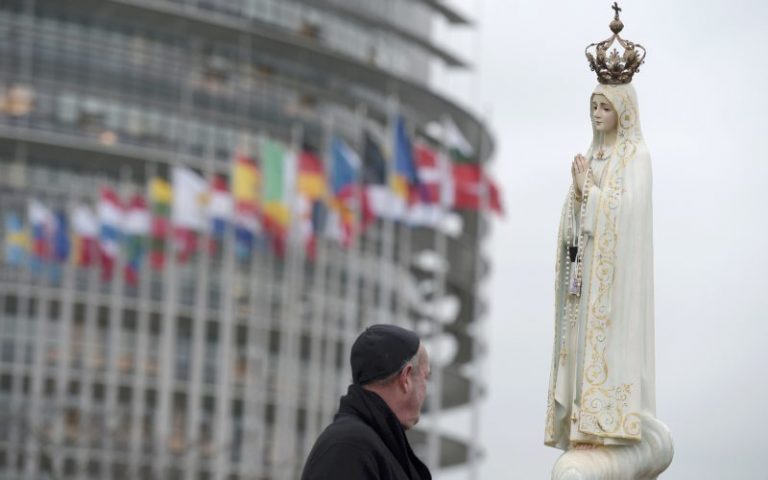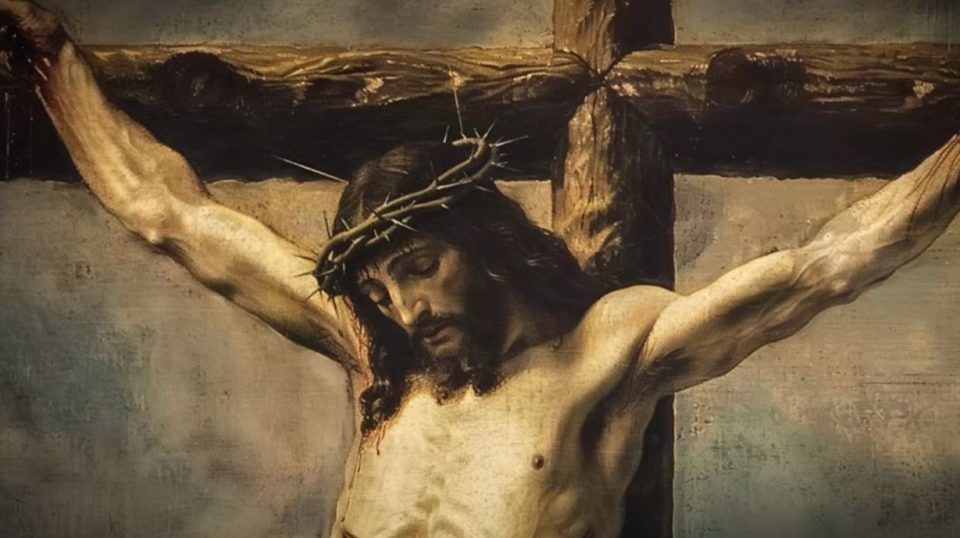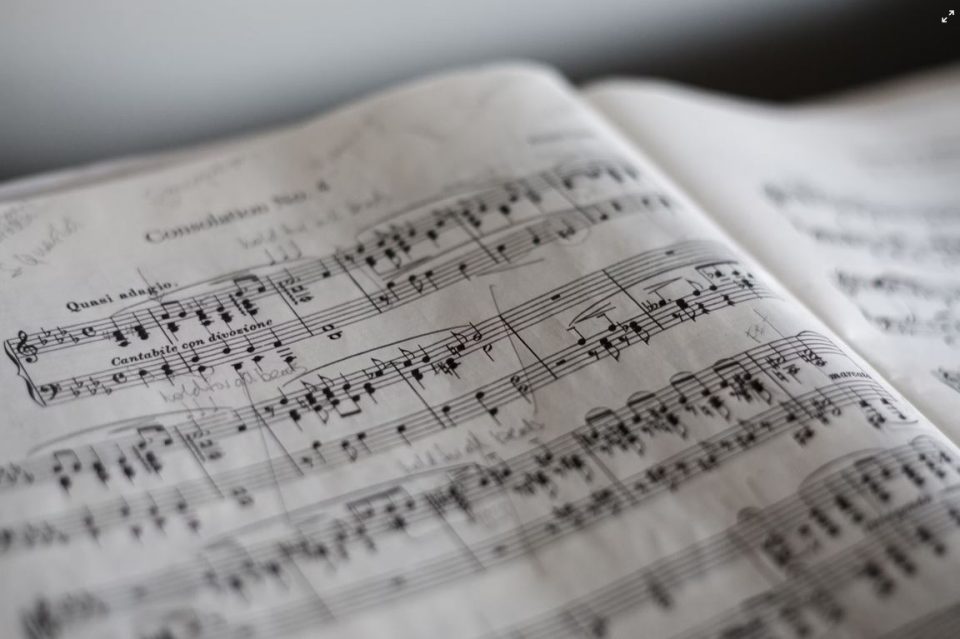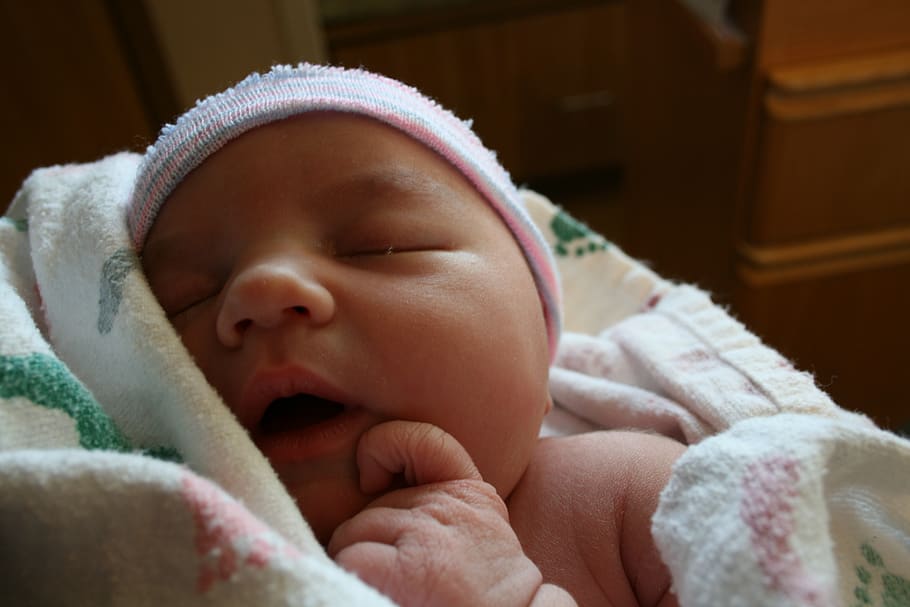Transgenderism: A State-Sponsored Religion?
January 25, 20189-Year-Old Girl With Rare Disease Asks for Prayer on the Day of Her Surgery, Pres. Trump Responds With a Special Message
January 25, 2018
Photo: A cleric stands near a statue of the Virgin Mary in front the European Parliament building in Strasbourg (Getty)
Never mind integralism. The Church and its members can show civil society the path out of the present crisis
By Ed Condon, Catholic Herald, Thursday, 25 Jan 2018
The classical liberal order which has defined Western society for the last few centuries is breaking down. From Trump to Brexit, we are seeing a violent split in politics between the populists (Marine le Pen, the AdF, Bannonism) and the technocrats (typified by the EU, whose President, Donald Tusk, ascended to his position after being kicked out by the Polish electorate). Where did it all go wrong?
The root of the problem is in liberalism itself. In classical liberal theory, the democratic political order is supposedly neutral: it tries to find a balance between different interest groups, to be an honest broker which seeks consensus while respecting minority groups. Yet since the cultural revolutions of the 1960’s, classical liberalism has given way to a much more strident secular progressivism. Far from being neutral, the new liberals want to be both player and umpire in society and politics. Last week, Canadian Prime Minister Justin Trudeau said that explicitly pro-life organisations were “not in line with where we are as a government or society” and could expect no quarter from him. Far from being “liberal” in either the classical or literal sense of the word, for modern secular progressives there is no line between state and society. Dissenters from “where we are” have no place in government or society. Policy is dogma.
The progressive worldview, on everything from freedom of speech to gender theory, has mutated into an ideological creed. President Trudeau and his ilk believe, not unlike Catholic integralists of the past, that their creed should define the workings of the state; and they support their beliefs with the full machinery of government – as Christian bakers on both sides of the Atlantic have been finding to their cost.
Progressive integralism, like the Catholic variety, has an uneasy relationship with coercion. As the liberal order falls apart, some well-respected Catholic thinkers survey the anti-liberalism of our time and – understandably enough – are weighing the merits of a return to the traditional integralist vision, in which the Church, while not replacing the civil power, is its guiding light.
But the lessons of history, for both Catholic and liberal integralists, are fairly stark: the certainty of belief and the coercive power of the state can make for an especially dangerous combination – one which too easily lends itself to tyranny, however well intended at the start.
At the other end of the spectrum, some Catholics have despaired, calling for a conscious retreat from mainstream society into a self-preserving Christian sub-culture. While Rod Dreher has been at pains to distance himself from such an interpretation of his famous Benedict Option, there are those who think wistfully about taking to the hills, metaphorically or literally. They see no way past or through the current progressive order and essentially cede the contest for society’s soul. The temptation to withdraw into ourselves and take as read a secularist society which cannot be changed, only resisted, is a counsel of defeat. It essentially holds that the Church’s transformative mission is, in our time, a romantic lost cause.
Between seeking to bring about an explicitly Christian political order or battening down the hatches, which I would suggest are too open to mentalities of conquest or surrender, I would propose a third way. We can bring the full weight of Catholic thought and action to bear, not on conquering wider society, but enlightening it. To begin with, we must abandon the misconception that the Church is a sub-section of civil society. The Church is a society in its own right, which can be considered apart from the civil sphere, and its mission to enlighten is served best when it speaks in this capacity.
This idea was encapsulated in the historical self-description of the Church as a “perfect society” – perfect as in complete, rather than flawless. The phrase has been used less and less since Vatican II, but the documents of that Council, especially Lumen Gentium, underline that this is still very much the Church’s self-image. This perfect society, and the governing authority of the Church for her members, fits neither within nor above civil society, but is something wholly apart from it.
The Church, as a society in its own right, has the obligation to remain distinct from wider society. How it orders itself, by law and by morality, should serve as a mirror and light to the wider world; it is a work of inspiration and contrast, not of dominance or absorption. The Church shirks this duty by retreating in on itself but also, as history has shown, risks staining herself through direct involvement in civil affairs, however much the state may benefit from the association. It is not about the Church either claiming to be, or aiming to become, the exclusive home of the perfect, as opposed to the dirty world outside, but trusting that it is sustained by divine wisdom and grace, and ordered along a justice which the world can, and should, seek to imitate but cannot claim as its own.
As CC Pecknold recently noted on this site, Catholics are dual citizens, but with a clear hierarchy of loyalty. The society of the Church, through her own government and laws, places real demands on how Catholics act and view the world. Our priorities will always include an absolute respect for human life, the recognition of parents as the first educators and guardians of children, and the obligation to care for the poor. It is the responsibility of individuals to carry these priorities into the civil sphere, not as conquerors but as witnesses to something better. How we do this depends of our context. For a Christian in Iraq, it may be nothing short of accepting the risk of martyrdom. For us in the West it means contesting, in the voting booth, in the courtroom and, when necessary, on the street, the rising secular-progressive tide, not with the aim of imposing the Church’s views, but of guarding the freedom of her and her members, a freedom which is essential to proclaiming that above all laws and governments, civil and ecclesiastical, is the natural and divine law of God which offers to liberate, not dominate mankind, and which is its first, last, and best hope of peace.
The current collapse of classical liberalism, something positively willed into existence through aggressive and divisive identity politics, demands an answer. Catholics should draw strength, personal and intellectual, from the society of the Church and, so fortified, insist that our civil sphere reflect the freedom and dignity which is the birthright of all people. How we do that needs urgent discussion.







